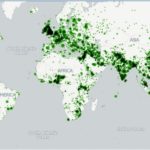BBVA to boost social its impact in 2018, with an eye on the U.N.'s Sustainable Development Goals
Putting up a new calendar and starting a new year means taking stock of past achievements and setting new goals. In the area of Responsible Banking, BBVA is ready to take on new challenges, in order to continue making strides in responsible financing, digital transformation, human rights and other important areas.

The year 2030 is the deadline marked by the UN’s Sustainable Development Goals agenda to achieve a sustainable world. BBVA is aware that the time to spring into action is now and is already making progress with support from all its stakeholders.
The goal for 2018 is clear: To continue contributing from the financial sector to building a better world where everyone enjoys the same opportunities.
As the new year approaches, BBVA is working on a roadmap with a very clear direction and the following key milestones:
Sustainable financing: Solutions with social impact
It’s undeniable that banks play a pivotal role in the common objective of achieving a more sustainable economy through financing. In this regard, BBVA is one of the most active European banks in sustainable finance and has outlined a solid project finance policy based on the Equator Principles.
For several years now, BBVA has been working on providing customers with innovative solutions to help them transition toward a low-carbon economy. In February 2017, BBVA signed a €500 million green loan with Iberdrola, the first-ever with an energy company. This transaction was the first one of its kind in the world, both in terms of size and characteristics, and marked a key milestone in a market that has been growing for the past 10 years. BBVA, already a leader, became a pioneer in green finance, offering innovative and social impact solutions in the investment sector.
But this was not BBVA’s only achievement during 2017. There were other milestones, such as the signing of the world’s first green loan under a project finance scheme with the Italian company Terna, or the loan granted to Novo Hospital de Vigo, the first example of green project finance in Spain . Both transactions underpinned BBVA’s position as an important player in the sector.
The green loan market, although still in its infancy, is expected to keep growing in 2018. In this field, BBVA has the capacity to offer sustainable financial solutions in the form of both bonds and loans, while providing key advice to its customers. The year 2018 will see the company move forward in this regard.

Novo Hospital de Vigo.
TCFD: New steps to manage risks
Applying the principles of sustainable financing requires research, innovation and solutions in the risk management area. "At BBVA, we are defining a new Environmental and Social Framework to integrate the new emerging threats into our risk assessment model, but also to promote the development of the great business opportunities offered by sustainable financing," said Antoni Ballabriga, Global Head of Responsible Business of BBVA, during his presentation at the European Banking Summit 2017.
BBVA is making great strides in this area. The institution recently joined a pilot 16-bank group which, under the guidance of the United Nations Environment Program - Finance Initiative (UNEP FI), works on implementing the recommendations issued by the Task Force on Climate Related Climate Disclosures (TCFD), created by the Financial Stability Board (FSB). During the next two years, this group will be responsible for analyzing how global warming will affect the banking business around the world. The participating banks will focus on analyzing physical risks (those directly linked to climate change) and transition risks (ones that result from regulatory, technological and social changes). Afterwards, they will evaluate the ways of integrating these factors in their risk assessment models.
BBVA has already defined an action plan to adapt its risk management model and publish the required information, following TCFD recommendations in areas such as corporate governance, strategy, risk management, metrics and objectives.

Simone Dettling, of the UNEP Finance Initiative; Esko Kivisaari, Deputy Managing Director of Finance Finland; Sirpa Pietikäinen, member of the European Parliament and Antoni Ballabriga, BBVA's Global Head of Responsible Business, during his speech at the European Banking Summit 2017.
Non-financial reporting: new progress being made
In 2017 it became official: in Spain, a Royal Decree on non-financial reporting by large corporations, companies will have to expand the non-financial information in their management reports and annual corporate governance reports. This new obligation, and how comply with it, will be one of the most important Corporate Social Responsibility (CSR) topics during the new year.
BBVA is working on applying the new directive and will expand its financial and non-financial information for 2017. The bank already included this content in its annual reports, devoting a section to its strategy and reporting efforts during the year.

Mentions in the media about cyber attacks between 2015 and 2016. - BBVA RESEARCH Y GDELT
Commitment to Human Rights
BBVA has carried out a due diligence process in all its areas and in all the countries where it has a presence, to elaborate its new commitment to Human Rights. This process was both complex and ambitious: It required measuring the potential impact of the bank’s operations in terms of Human Rights, designing mechanisms to prevent and reduce said impact, and establishing the appropriate channels and processes to ensure the allocation of adequate repair mechanisms in case of breach.
All this work has been carried out in accordance with the Guiding Principles on Business and Human Rights, promoted by the UN’s Human Rights Council, which are based on three pillars:
- The States’ duty to protect.
- Corporations’ responsibility to respect human rights.
- The joint obligation to find mechanisms that ensure the repair of possible violations of Human Rights.
In addition to this new commitment, BBVA has set the following policies and regulations to reinforce compliance: The BBVA Code of Conduct, the Responsible Purchasing Policies, the BBVA Defense Action Norms and the Housing Policy in Spain.
Big data
In an increasingly uncertain environment, traditional measurement methods are starting to fall short. Events that have an economic impact that is hard to measure - such as the refugee crisis or the consequences of natural disasters – require new tools and processes to analyze data responsibly and work in favor of social challenges. BBVA is aware that the possibilities in this field are immense.
One good example of this is BBVA Research, a unit that is capable of monitoring geopolitical events to identify their impact. In this sense, BBVA Research has drawn up a map capturing the effects of political and economic events, such as the impact of the slowdown in the Chinese economy in the rest of the world.
BBVA is starting to contemplate business options for individuals that combine big data, environment and social responsibility. There are already examples in the market, such as UP4DATA, a startup that has provided Fundación Telefónica’s Digital Employment program and developed a Business Intelligence and Big Data tool that can make measurements of corporate responsibility.